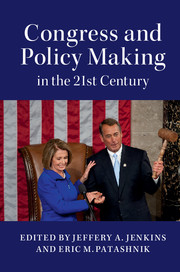Book contents
- Frontmatter
- Contents
- List of Figures
- List of Tables
- List of Contributors
- Acknowledgments
- 1 The Evolving Textbook Congress: Polarization and Policy Making on Capitol Hill in the 21st Century
- PART I CONGRESSIONAL POLICY MAKING IN A POLARIZED AGE
- PART II CONGRESS AND SOCIETY
- PART III CONGRESS AND ECONOMIC POLICY
- PART IV CONGRESS AND DOMESTIC POLICY DILEMMAS
- 9 The $40 Trillion Question: Can Congress Control Health Care Spending?
- 10 The Demise of Immigration Reform: Policy-Making Barriers under Unified and Divided Government
- 11 It's Hard to Get Mileage Out of Congress: Struggling Over CAFE Standards, 1973–2013
- PART V REFLECTIONS
- Index
10 - The Demise of Immigration Reform: Policy-Making Barriers under Unified and Divided Government
from PART IV - CONGRESS AND DOMESTIC POLICY DILEMMAS
Published online by Cambridge University Press: 05 February 2016
- Frontmatter
- Contents
- List of Figures
- List of Tables
- List of Contributors
- Acknowledgments
- 1 The Evolving Textbook Congress: Polarization and Policy Making on Capitol Hill in the 21st Century
- PART I CONGRESSIONAL POLICY MAKING IN A POLARIZED AGE
- PART II CONGRESS AND SOCIETY
- PART III CONGRESS AND ECONOMIC POLICY
- PART IV CONGRESS AND DOMESTIC POLICY DILEMMAS
- 9 The $40 Trillion Question: Can Congress Control Health Care Spending?
- 10 The Demise of Immigration Reform: Policy-Making Barriers under Unified and Divided Government
- 11 It's Hard to Get Mileage Out of Congress: Struggling Over CAFE Standards, 1973–2013
- PART V REFLECTIONS
- Index
Summary
INTRODUCTION
Comprehensive immigration reform (CIR) has loomed for some time as one of the most elusive items on the Congressional agenda. Yet twice in recent years – once during unified party control of the branches in 2009–10 and again during divided government in 2013 – the chances for sweeping reform legislation were quite palpable. The failure of CIR in the 111th (2009–10) and 113th (2013–14) Congresses presents different and intriguing puzzles. Why did the Obama administration largely avoid immigration reform in 2009–10 despite its crucial role for the Democratic Party and strong margins of control by Democrats in both the House and Senate? How did Congress come far closer to enacting CIR during divided party control in 2013, with passage of a bipartisan Senate bill, and why was it ultimately derailed in the House?
As Barbara Sinclair underscores in Chapter 3, high levels of partisan polarization do not make landmark legislative innovation impossible during periods of unified party control of Congress and the White House. In fact, as various chapters in this volume demonstrate, Obama-led Democrats in the 211th Congress passed a major economic stimulus package, historic health care legislation, and other significant reforms targeting regulation of the financial services industry, child nutrition, fair pay, student loans, repeal of a ban on qualified gay and lesbian serving in the armed forces, and other agenda items. This record of marked legislative productivity raises the question of why President Obama and Democratic leaders in Congress did not press their advantage to enact a partisan, pro-immigration law that, among other things, satisfied most Latino and Asian voters by legalizing millions of undocumented immigrants residing in the country.
Strikingly, many pundits and scholars alike thought major immigration reform was a fait accompli following the presidential election returns of 2012. In contrast to many issues examined by Sinclair and others, CIR presented distinctive incentives for many lawmakers to act in spite of divided party control of the branches in the 113th Congress. “We will get immigration reform,” David Gergen confidently told CNN viewers soon after the election. “Democrats want it and Republicans now need it.” The reason was obvious: more than 70 percent of Latino voters supported Obama, with Asian voters (less numerous overall) voting for Obama in even larger proportions.
- Type
- Chapter
- Information
- Congress and Policy Making in the 21st Century , pp. 242 - 271Publisher: Cambridge University PressPrint publication year: 2016



